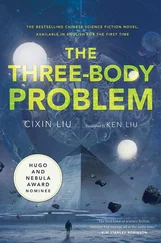“But what’s the point of that?”
“We’ll at least know that the droplet group has entered the Solar System. They might strike civilian targets in space, so all ships will need to be recalled, or at least those in the droplets’ path. And the inhabitants of space cities will have to be evacuated to Earth, because those are weak targets.”
“There’s another matter that’s even more critical,” the Wallfacer Project Commission chair said. “Identifying safe routes for the possible withdrawal of spacecraft into deep space.”
“Withdrawal into deep space? We’re not talking about Escapism, are we?”
“If you must use that name.”
“Why not begin the escape now?”
“Present political conditions do not permit it. But when the droplet group approaches Earth, a limited-scale flight might become acceptable to the international community. Of course, it’s only a possibility. But the UN and the fleets must make preparations for it.”
“I understand. But the Snow Project doesn’t really require me.”
“It does. Even inside the orbit of Jupiter, creating a dust cloud is an enormous undertaking and will require the deployment of almost ten thousand stellar hydrogen bombs, more than ten million tons of oil film, and the formation of an enormous space fleet. To accomplish that within three years requires taking advantage of your current status and prestige to organize and coordinate the resources of the two Internationals.”
“If I agree to undertake this mission, when will you wake them?”
“Once the project is started. Like I said, it won’t be a problem.”
* * *
But the Snow Project never got fully off the ground.
The two Internationals were not interested in the project. What the public wanted was a strategy for global salvation, not a plan that would merely inform them of the enemy’s arrival so they could escape. Besides, they knew that this wasn’t the Wallfacer’s idea. It was just a plan implemented by the UN and SFJC that exploited his authority. A full launch of the Snow Project would bring the entire space economy to a standstill and lead to a general economic recession on Earth and in the fleet. In addition, contrary to the UN’s prediction, as the droplets drew nearer, Escapism turned even more repugnant in the eyes of the public, so the two Internationals were unwilling to pay such a high price for an unpopular plan. As a result, both the construction of a fleet to gather the oil film material on Neptune and the manufacture of sufficient stellar hydrogen bombs to supplement the fewer than one thousand from the Great Ravine that were still usable made very slow progress.
But Luo Ji poured himself entirely into the project. At first, the UN and the SFJC had only wanted to exploit his prestige to mobilize the resources needed, but Luo Ji immersed himself in every detail of the project, spending sleepless nights shoulder-to-shoulder with the scientists and engineers of the Technical Committee and proposing many of his own ideas. For example, he suggested that a small interstellar ion engine be installed onto each bomb to allow them a certain degree of mobility in orbit, enabling timely adjustments to the density of the stellar cloud in different regions. More importantly, the hydrogen bombs could act as attack weapons. He called them “space mines,” and argued that even though stellar hydrogen bombs had proven incapable of destroying droplets, they might in the long run be useful against Trisolaran ships, because they had no evidence that the ships were also constructed out of strong-interaction material. He personally determined the orbit for every bomb’s deployment. From a modern technological perspective, his ideas may have been full of a twenty-first-century ignorance and naiveté, but his prestige and Wallfacer status meant that most of his suggestions were adopted.
Luo Ji treated the Snow Project as a means of escape. He knew that he wanted to escape reality, and the best way to do that at present was to involve himself deeply in the project. But the more he devoted himself to it, the more disappointed in him the world became. Everyone knew he had only attached himself to the largely insignificant project so that he could see his wife and child as soon as possible. The world waited for a plan for salvation that never materialized. Luo Ji declared over and over in the media that without the capability to use stellar power to send out a spell, he was powerless to do anything.
The Snow Project ground to a halt after a year and a half, at which time only 1.5 million tons of oil film had been collected from Neptune. Even adding the 600,000 tons collected for the Fog Umbrella, the figure was still far from what the project required. Ultimately, 3,614 stellar hydrogen bombs packed in oil film were deployed in an orbit two AU from the sun. This wasn’t even a fifth of the intended number. When detonated, they would form a large number of independent dust clouds orbiting the sun, rather than a continuous dust cloud belt, greatly reducing their effectiveness as a warning.
It was an age in which hope came as quickly as disappointment, and after anxiously waiting for a year and a half, the public lost faith and patience in Luo Ji the Wallfacer.
At the general meeting of the International Astronomical Union, a body that last attracted worldwide attention in 2006 when it revoked Pluto’s eligibility as a planet, a large number of astronomers and astrophysicists were of the opinion that the explosion of 187J3X1 was a chance occurrence. Being an astronomer, Luo Ji may have discovered certain signs that the star would explode. The theory was full of holes, but more and more people came to believe it, accelerating Luo Ji’s decline in prestige. In the eyes of the public, his image gradually transitioned from messiah to commoner, and then to fraud. He still enjoyed the Wallfacer status granted by the UN, and the Wallfacer Act was still in effect, but he no longer had real power.
Distance of the Trisolaran Fleet from the Solar System: 2.07 light-years
On a cold, drizzly autumn afternoon, a meeting of the New Life Village #5 Residents’ Council came to the following decision: Luo Ji would be expelled from the neighborhood on the grounds that he was affecting the normal life of the neighborhood’s residents. While the Snow Project was in progress, Luo Ji had frequently gone out to attend meetings, but the majority of his time was still spent in the area, and he kept in contact with various Snow Project entities from home. Disruptions had only worsened as his position declined, since from time to time crowds of people would gather at the foot of his building to jeer at him or throw stones at his window. Media interest in the spectacle was enough to make reporters as numerous as protestors. But the real reason for Luo Ji’s expulsion was that he was an utter disappointment to the hibernators.
When the meeting adjourned that evening, the neighborhood committee director went to Luo Ji’s home to inform him of the council’s decision. After pressing the doorbell repeatedly, she pushed open the unlatched door and practically choked on the mix of alcohol, smoke, and sweat that filled the room. She noticed that the walls had been converted into city-style information surfaces that allowed information screens to be called up anywhere with just a tap. A confusion of images filled the walls, most of them displaying complex data and curves, but the largest showing a sphere suspended in space: a stellar hydrogen bomb packed in oil film. The transparent film with the bomb clearly visible within it reminded the director of a marble, the sort of thing children liked to play with back in Luo Ji’s day. It rotated slowly. There was a small protrusion at one pole—the ion engine—and in the sphere’s smooth surface was the reflection of a tiny sun. All of those dazzling screens turned the room into a huge gaudy box. Since the lights were off, they were the only source of illumination, dissolving everything into blurry color so that it was hard at first to distinguish what was a physical presence and what was just an image.
Читать дальше












